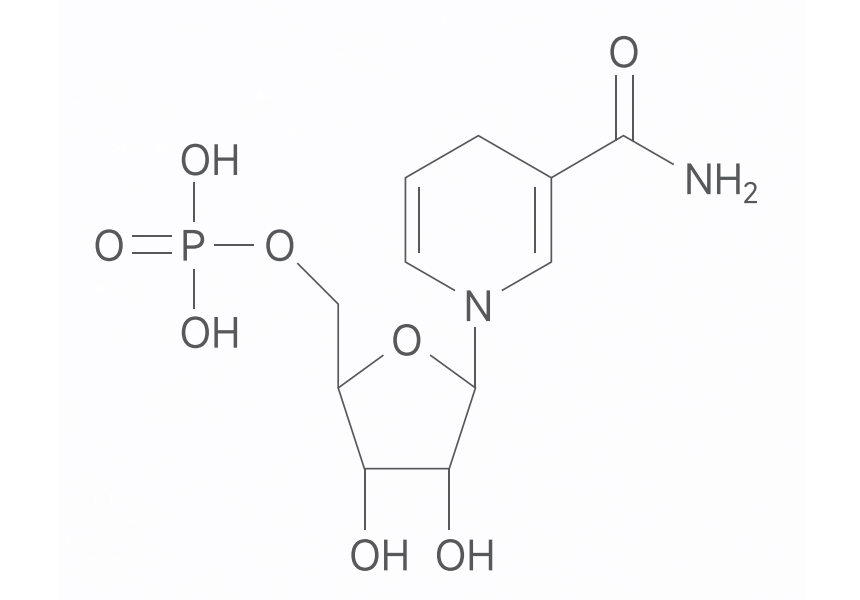NMNH (Reduced Nicotinamide Mononucleotide) is the reduced form of Nicotinamide Mononucleotide (NMN). It is a precursor of NADH (the reduced form of Nicotinamide Adenine Dinucleotide), an essential cofactor in cellular redox reactions. Below are its chemical structure and physical properties:
Chemical Structure of NMNH:
- IUPAC Name: 1-(β-D-Ribofuranosyl)-1,4-dihydronicotinamide-5′-monophosphate
- Molecular Formula: C11H16N2O8P
- Molecular Weight: 334.23 g/mol
- SMILES Notation: C1=CC(=O)NC(C1)C2=NC(=C(O2)CO)O
- Structure Description: NMNH has a nicotinamide ring connected to a ribose sugar, which is linked to a phosphate group. The structure is similar to that of NMN, but with an additional hydrogen atom on the nicotinamide ring, which reduces it.

Physical Properties of NMNH:
- Appearance: White to off-white crystalline powder.
- Solubility: Soluble in water and aqueous solutions. It is generally stable in aqueous solutions.
- Melting Point: Decomposes before melting.
- Stability: Sensitive to light and air. It is stable under acidic conditions but can be sensitive to alkaline conditions, where it may degrade.
- Optical Rotation: The specific rotation is dependent on the concentration and solvent used, typically observed around +20° to +25° in water.
Biological Role:
- NMNH is a key intermediate in the biosynthesis of NADH, which is vital for energy production and various metabolic processes in cells.
- It participates in redox reactions and is involved in numerous cellular processes, including mitochondrial function and sirtuin activation.
NMNH is a relatively less studied compound compared to its oxidized counterpart, NMN, but it holds potential interest in fields such as aging research and metabolic studies.

Potential Benefits of NMNH
NMNH (Reduced Nicotinamide Mononucleotide), is a derivative of Nicotinamide Mononucleotide (NMN), which is itself a precursor to Nicotinamide Adenine Dinucleotide (NAD+). NAD+ is an essential coenzyme in the body involved in various metabolic processes, including energy production, DNA repair, and regulation of cellular aging. Reduced NMN (NMNH) represents a more bioavailable form of NMN, and recent studies are exploring its potential health benefits. Here are some of the potential benefits of NMNH:
1. Enhanced NAD+ Production:
- NMNH can be more efficiently converted into NAD+ compared to its oxidized counterpart (NMN). NAD+ levels naturally decline with age, and boosting NAD+ levels may help support energy metabolism and cellular health.
2. Improved Cellular Energy and Metabolism:
- NAD+ plays a crucial role in cellular energy production. By supporting NAD+ levels, NMNH may help improve mitochondrial function and energy metabolism, potentially combating fatigue and enhancing overall vitality.
3. Anti-Aging and Longevity:
- Higher NAD+ levels have been associated with improved DNA repair, reduced oxidative stress, and enhanced cellular resilience. NMNH supplementation could contribute to anti-aging effects and promote longevity by supporting these processes.
4. Neuroprotection and Cognitive Function:
- NMNH may support brain health by boosting NAD+ levels in the brain, which can help protect against neurodegenerative conditions and improve cognitive functions such as memory and learning.
5. Cardiovascular Health:
- By enhancing NAD+ levels, NMNH may help support cardiovascular health through improved endothelial function and reduced inflammation, potentially lowering the risk of heart disease.

6. Improved Insulin Sensitivity:
- NAD+ is involved in glucose metabolism and insulin sensitivity. NMNH might help improve metabolic health and reduce the risk of conditions like type 2 diabetes.
7. Support for Muscle Function:
- Increased NAD+ levels can improve muscle function and endurance by enhancing mitochondrial function and energy availability in muscle cells, potentially aiding in exercise performance and recovery.
8. Sirtuin Activation:
- NMNH, like NMN, may activate sirtuins, a family of proteins associated with longevity, stress resistance, and metabolic regulation.
Research and Considerations:
While the potential benefits of NMNH are promising, it is important to note that research is still in the early stages. Most studies have been conducted in animal models, and more human clinical trials are needed to confirm these benefits and determine the optimal dosing and safety profiles.
As with any supplement, it’s advisable to consult with a healthcare professional before starting NMNH, especially if you have underlying health conditions or are taking other medications.
